
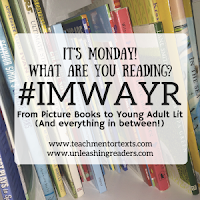
It'sMarvelous Middle Grade Monday
at
and #IMWAYR day
at
Hopkinson, Deborah.
World War II Close Up: They Saved the StallionsOctober 15, 2024 by Scholastic Focus
ARC provided by Young Adult Books Central
I am convinced that there is so much interesting information about World War II that books will still be published on the topic in 2095! It's still a popular topic with young readers, especially when undiscovered facets, such as the plight of the famous Lippizaner stallions in Austria, come to light.
The action starts at a high point, with Alois Podhajsky's need to leave the Spanish Riding School in Vienna with the Lipizzaner stallions. He'd been keeping them safe for four years, but could see that the current rounds of bombing were making it impossible to stay. How does one evacuate so many horses? But first, we flashback and find out how he came to be involved with this fabled institution, and how one of the horses, Nero, was responsible for all of the others being safe at the end of the war.
Born in 1898 in what is now Bosnia and Herzegovina, Podhajsky moved frequently with his father, who was in the army. Because of the changing boundaries during the early part of the twentieth century, he learned many languages. He was very interested in equestrian pursuits, and joined the army in 1916, and his life was saved by one of the horses. In 1932, he started working for the Spanish Riding School, which allowed him to use his many skills at dressage. In 1938, Austria was annexed by the Germans, which meant that Podhajsky had to answer to them. He took it as his personal mission to keep the horses and the school safe.
This was not an easy task. The stud farm, and the mares, had been moved to the relative safety of Czechoslovakia. As the war progressed, Podhajsky used the horses to haul the furnishing and memorabilia of the school to a safer area. He also found a castle in St. Martin, and got permission in 1944 to evacuate the horses to the stables there. This was no small task. It involved getting the horses onto trains, which were frequently attacked. Once the horses were in St. Martin, there were problems with their accomodations (the horses ate some of the new wooden enclosures!) as well as with the local residents, who thought that horse meat would be a good way to supplement their meager meat rations! Still, he was able to keep the horses safe.
When the US troops arrived, he was able to get an audience with Patton, thanks to a horse named Nero who had been in the 1936 Olympics. Podhajsky asked Patton for special protection, as well as help in evacuating the mares to a safer place, since they were in an area upon which the Soviets were advancing. Patton was glad to provide both, and the groundwork was done by various soldiers who were fond of the horses. Operation Cowboy is one of those WWII initiatives that was unknown to me, but was utterly fascinating.
Hopkinson always does excellent research, and there's a small example of how thorough she is. There's a brief description of deciding the date of one particular photo of Podhajsky and Patton that will gladden the heart of any historical researcher. I also loved the fact that fellow historican Candace Fleming makes an appearance, showing up the Spanish Riding School, to which she traveled.
Neither WWII or horses is a hard sell in middle school, and this was a tremendously engaging book that will find a wide readership. It's right at home with other nonfiction books like Weintraub's
No Better Friend but is a great companion for fiction books like Kerr's tremendous
The Winter Horses, which covers the plight of Przewalski's horses in Ukraine during WWII, or Earle's
When the Sky Falls, about animals in the London Zoo during the Blitz, as well.
Jackson, Tom.
Dinopedia: An Encyclopedia of Prehistoric Beasts
October 15, 2024 by Laurence King Publishing
Copy provided by the publisher
While I have never been personally that interested in dinosaurs, elementary and middle school students definitely can become obsessed with this topic and want more and more books about these prehistoric creatures! Titles like
How to Survive in the Age of the Dinosaurs, and
The Dinosaur Atlas are in steady, if not constant demand, and the one thing that I have learned about dinosaur books is that they MUST be current. Just one book on the shelves with a brontosaurus in it (back in the day; the name has been restored as a creature somewhat smaller than the apatosaurus) will lead to a very long conversation with an enthusiast who needs me to actually care about these small differences!
Jackson's Dinopedia is a good overview of dinosaur facts, and is arranged in a sensible, chronological way. There are a handful of dinosaur predecessors for the Paleozoic period, and four dinosaurs from the Triassic. The Jurassic and Cretaceous period have the really cool creatures, and in between the two page spreads for each entry, illustrated in the same brightly enthusiastic colors seen on the covers, there is supplemental information about fossil hunters, what dinosaurs sounded like, how flight evolved, how dinosaurs moved, and even a brief description of the Bone Wars in the 1860s between paleontologists Edward Drinker ope and Othniel Charles Marsh. Let's just say that scientific practices have become much more ethical in the last 150 years!
The text is very colloquial and conversational, and offerrs details about the various attributes of each dinosaur. These are a little sensational when it comes to descriptions of dinosaur methods of fighting and eating each other; what's the point of dinosaurs if not to read about them crushing each other and attacking with banana shaped teeth or pointy horns?
There's a solid explanation of how dinosaurs died out, but a chapter of animals today that have some similarities to their bygone kin, and a brief note about the world today and the rise of humans. There is a nice glossary, although no bibliography or source notes, which librarians like to see, but young readers don't necessarily require.
This would make an excellent gift for a young dinophile, since the bright pictures are very appealing, but would also be a good addition to a public or school library. The cover feels like it is either cloth or textured paper, so I'll have to see how well it survives without a dust jacket.






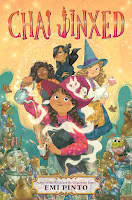

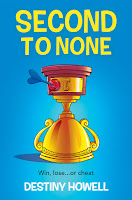






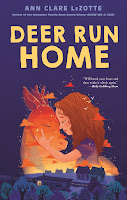
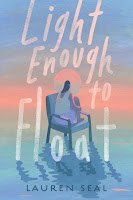







.jpg)























